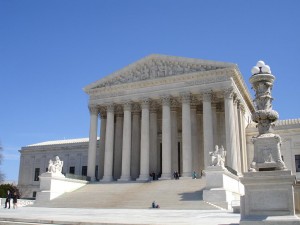 The U.S. Supreme Court started its term today, hearing oral arguments for Kiobel v. Royal Dutch Petroleum. The case involves the interpretation of a federal statute enacted by the first Congress as part of the Judiciary Act of 1879—the Alien Tort Statute.
The U.S. Supreme Court started its term today, hearing oral arguments for Kiobel v. Royal Dutch Petroleum. The case involves the interpretation of a federal statute enacted by the first Congress as part of the Judiciary Act of 1879—the Alien Tort Statute.
The Alien Tort Statute (ATS) provides that “[t]he district courts shall have original jurisdiction of any civil action by an alien for a tort only, committed in violation of the law of nations or a treaty of the United States.” The statute was all but unused until 1980, when the U.S. Court of Appeals for the Second Circuit ruled in Filartiga v. Pena-Irala that the ATS conferred jurisdiction over a lawsuit brought by a foreign national against another foreign national over actions that took place overseas. Since that ruling, the ATS has come up a handful of times, but only once previously before the Supreme Court.
In Kiobel, the case the Supreme Court heard today, twelve Nigerian nationals sued three European oil companies for helping the Nigerian government to kill and torture civilians. The case was originally filed in the U.S. District Court for the Southern District of New York, and the district court dismissed all claims against the corporate defendants, finding that the ATS imposes liability only against individuals, not corporations. On appeal, the U.S. Court of Appeals for the Second Circuit affirmed the dismissal of the claims.
The Supreme Court originally granted review in October 2011, but only as to the question whether the ATS applies to corporate conduct abroad. Shortly after hearing arguments on that issue in February 2012, the Court ordered supplemental briefing on the question whether an ATS claim could proceed when the conduct giving rise to the claim occurred wholly outside of the United States. Today’s oral argument focused on this second question.
Proponents of a broad reading of the ATS—that is, those who argue that the ATS does impose liability on corporations for extra-territorial misconduct—put forth several arguments in favor of their position:
- No court has ever imposed a territorial limit on these types of claims, and imposing one in this case would contravene U.S. foreign policy in favor of accountability for gross violations of international law.
- The Supreme Court’s 2004 decision in Sosa v. Alvarez-Machain already affirmatively answers whether the ATS may reach certain limited actions occurring on foreign soil.
- The plain language of the statute militates against imposing a territorial limitation.
- The accusations in this case are so atrocious that “every nation may assert universal jurisdiction over the perpetrators.”
The parties advocating for a narrower interpretation of the statute argued the following:
- U.S. law does not extend outside U.S. territory unless Congress explicitly says that it does.
- Reading the ATS as applying to extra-territorial conduct would violate the law of nations because it infringes on sovereign nations’ right (and duty) to address violations that occur within their own territories.
As SCOTUSBlog’s Lyle Denniston explains, the Court’s decision will likely turn on whether the Justices conclude that Congress should determine the reach of the law, which would result in a restrictive reading of the ATS; or that foreign policy is the essence of the law, in which case the ATS might be read more broadly.
Based on today’s oral arguments several commentators predict that the Court will limit the scope of the ATS, rather than interpreting it more broadly.
Additional Resources:
Oral Argument in Kiobel v. Royal Dutch Petroleum (October 1, 2012), U.S. Supreme Court
Oral Argument in Kiobel v. Royal Dutch Petroleum (February 8, 2012), Oyez
Kiobel Symposium, SCOTUSBlog
